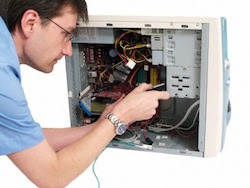If your computer starts to move slowly? I mean, look at the blue circle icon spinning is not fun, especially when you have to splash out a lot of money or you are working on something to meet the deadline. There are several reasons that make your computer loads slow, namely:
1. Spyware and Viruses
This is the number one culprit and the most common problems users are facing today. If you want to download illegal torrents or other items from an unknown site, you are likely to become victims of spyware and computer viruses. Antivirus download can help you to solve the problem. Most antivirus program offers a 30-day free trial, so you can try before you decide whether to buy it.
2. Item trash
If you have been using your computer for some time, you will definitely see some unwanted files such as cache files, cookies, and other unnecessary components that clogs your system. Most of the time users are not even aware of the existence of this file.
3. Unwanted applications and pop-ups
Programs and applications can also cause a computer to slow down. Check your system and see if you have an application that you forget to uninstall. Prohibition automatic pop-ups can also solve the problem. Now you know the reason why the computer does not perform as fast as it should, it's time to learn how to improve performance, or better, to its original state.
Here are some tips to speed
4. Eliminate virus
Once you download the antivirus software, AutoScan schedule every week to prevent your computer from becoming infected. Look for warning signs when you want to download from an unknown source, read the reviews of the site you want to download from and if you can afford it, pay for an antivirus package because they can provide a detailed scan of your computer. If you have several family members in your home, you can consider buying a license some users because it is cheaper than the individual license.
5. Delete the file
Once a month, clean the temporary folder because you will not need them in the future. To clean up the files,
a. click the Start button
b. click Control Panel
c. click Network and Internet and then click Internet Options
e. Click the General tab, and then
f. Click Delete under Browsing history
g. Click Delete all, click Yes to confirm that you want to delete this information, and then click OK
6. Uninstall
If you have a file that you will not use again, simply head to the Control Panel, click Programs, and then click Programs and Features. Select a program and click Uninstall.
7. Buy New or Re-Format
If the tips above can not solve your problem, you might want to consider reformatting your computer, but make sure you backup your files before proceeding! Still not working? Then only 2 options left are either upgrading your RAM or buy a new computer.





0 comments:
Post a Comment